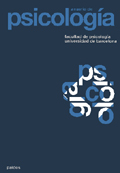Evaluation and treatment of social phobia in children and adolescents in Spanish and Portuguese speaking countries
Article Sidebar

Main Article Content
José Olivares Rodríguez
Social phobia or social anxiety disorder is defined as an intense and lasting fear of social situations in which the person is exposed to observation by others and experiences fear of doing something or behaving in a manner that is humiliating or embarrassing. It is distinguished from other disorders by the fear and avoidance of interpersonal situations and by its high interference in subjects’ daily lives. Social phobia is a serious public health problem, whose prevalence in the community is surpassed only by major depression and alcohol dependency. For this reason, its study, evaluation and treatment have been a priority for clinical psychologists ever since its classification as a diagnostic category. However, that preoccupation has not reflected by a development in psychological treatments that are independent of socio-economic-cultural contexts: whereas large epidemiological studies have been carried out among English native-speaking communities for children and adolescents, study of the disorder in Spanish and Portuguese speaking countries is still comparatively scarce. This paper aims to assess the current state of the research into the disorder in Spanish, Portuguese and Latin American children and adolescents, and to consider the planning of early detection and intervention programs that are adapted to our cultural contexts.
Key words: social phobia, evaluation and treatment, early detection and intervention, Spanish, Portuguese and Latin American children and adolescents.
Key words: social phobia, evaluation and treatment, early detection and intervention, Spanish, Portuguese and Latin American children and adolescents.
Article Details
How to Cite
Olivares Rodríguez, José. “Evaluation and treatment of social phobia in children and adolescents in Spanish and Portuguese speaking countries”. Anuario de psicología / The UB Journal of psychology, vol.VOL 40, no. 1, pp. 7-21, https://raco.cat/index.php/AnuarioPsicologia/article/view/135244.
Rights
Copyright
Authors transfer to the publisher all copyright for the full term of protection and for all the world.
The authors can post a copy of their articles in accordance with the policy of free access to the journal.
Most read articles by the same author(s)
- Ana Isabel Rosa Alcázar, Pablo J. Olivares-Olivares, José Olivares Rodríguez, The role of non-specific effects in the psychological treatment of adolescents with social phobia , Anuario de psicología / The UB Journal of psychology: 2009: Vol.: 40 Núm.: 1
- Ana Isabel Rosa Alcázar, José Olivares Rodríguez, Julio Sánchez Meca, Meta-análisis de la eficacia de las habilidades de afrontamiento en problemas clínicos y de salud en España , Anuario de psicología / The UB Journal of psychology: 2000: Vol.: 31 Núm.: 1
- Raquel Sánchez-García, José Olivares Rodríguez, Early intervention in children and adolescents with social phobia , Anuario de psicología / The UB Journal of psychology: 2009: Vol.: 40 Núm.: 1
- José Olivares Rodríguez, Presentación , Anuario de psicología / The UB Journal of psychology: 2009: Vol.: 40 Núm.: 1
- José Olivares Rodríguez, Pablo Vera-Villarroel, Daniela Arriagada, Daniela Jorquera, Rafael Canales, Ana Isabel Rosa Alcázar, José Antonio López-Pina, The first results of the adaptation of the Anxiety and Social Phobia Inventory among Chilean children , Anuario de psicología / The UB Journal of psychology: 2009: Vol.: 40 Núm.: 1